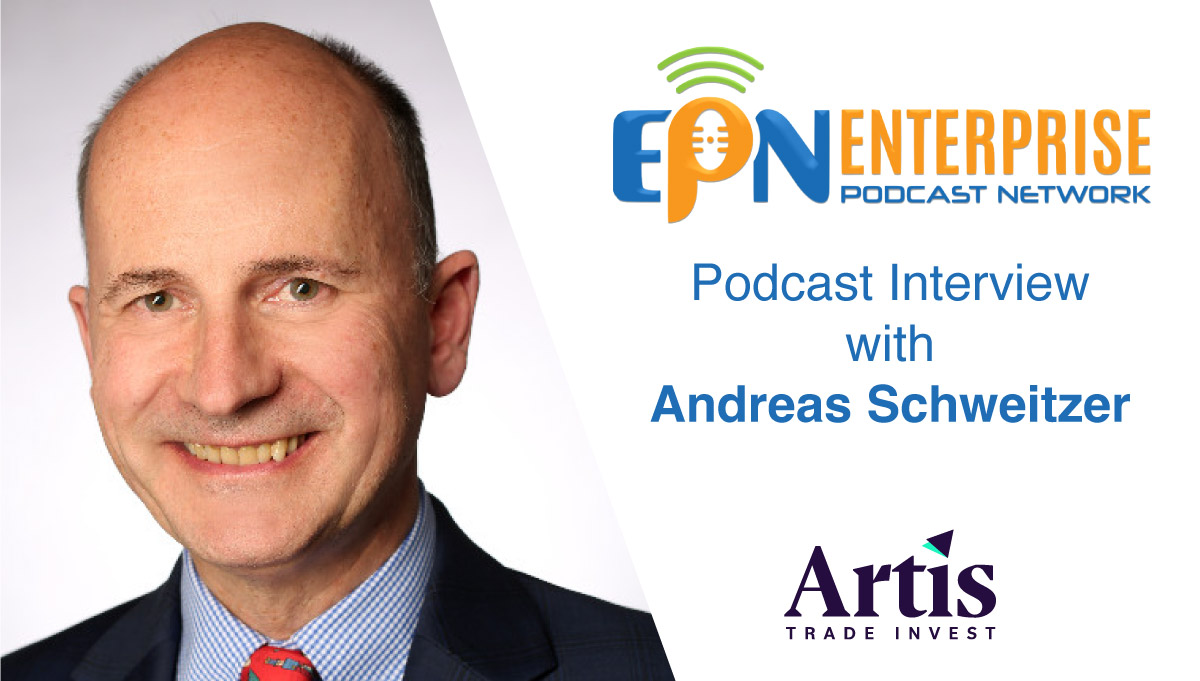Introduction: Welcome to Enterprise Radio, the signature show of the Enterprise Podcast network featuring some of the most prominent business professionals in the world today. And now your host, Eric Dye.
Eric Dye: This is Eric Dye and welcome to Enterprise Radio, part of EP and The Enterprise podcast. Now here today on the programme we’re speaking with Andreas Schweitzer, managing director of Artis Trade Invest – an EU regulated Trade Finance investment fund. Schweitzer is a Wall Street Journal bestselling author and his latest book is ‘Trade works: The trade finance investor’ has recently been published. Andreas, thanks for joining us here.
Andreas Schweitzer: Thank you and very good afternoon from London.
Eric Dye: And it’s good afternoon to you. Tell me, what is your background to get things underway here today. To kind of lay the groundwork here.
Andreas Schweitzer: I’m a Swiss, living in London and an entrepreneur. And since most of my life I have been on and in trade finance. I did what a Swiss can do. I worked for a bank and I worked for a chocolate company.
Eric Dye: Thanks for hitting the highlights on your background now. You wrote a book about trade finance. What was your inspiration to write the book?
Andreas Schweitzer: Just before the pandemic, we had to reinvent or during the pandemic, we had to reinvent the business. Like probably many of your listeners here and I realised that while I was doing trade finance, we wanted to grow this into a bigger business and there was very little written about it. So I had to do my own research and hired a research team. As little is published, we wrap up the research and try to explain to the financial and especially also not the non financial investor why credit insured factoring and the discounting of receivable is an underrated asset class. And why we like to have this in our portfolio. I have my own money in there and I’m a great fan of it. It’s a very safe, very low risk, low volatility, double digit yielding, Investment. So I felt that’s worth putting in writing.
Eric Dye: And no doubt about that, and thanks for your efforts in those regards. Now what makes trade finance such an attractive asset class?
Andreas Schweitzer: Now you get an insurance, you get credit insurance if you wish. So often governments insure a trade to help the SMEs in their trade efforts. Today you have about 2.8 trillion dollars, an incredible sum, of trade not happening because around the world 60% of credit requests get turned down. So if banks are not financing sufficiently private enterprise has to, and if I can give private credit, a loan to a company to buy for example chairs, desks, food, anything that is traded. And I get credit insurance. I have a very, very low risk investment. And a yield that in our cases significantly exceeds 10% a year.
Eric Dye: Certainly appreciate your joining us from London here today. We’re speaking with Andreas Schweitzer. He’s the managing director of Artis Trade Invest – an EU regulated trade Finance investment fund. Now, another question for you. Where is the investment opportunity with trade finance?
Andreas Schweitzer: Everywhere around the world, of course, and I don’t know where your listeners are all based. The US market is of course a huge market in itself, not a market we are in. We are based in the UK. Our world is more Europe than the US. At the moment we are looking at a few interesting niches. We only look at high yielding, low volatility niches and for example trading pharma in Europe is an extremely lucrative business. Pharma is very regulated like the financial industry. That is our favourite trade at the moment. Then we have interesting transactions in the Nordic countries, in Scandinavia and Sweden, also credit insured. But there we have a market where large buyers don’t deal with certain suppliers because the volume is not good enough to justify the cost of all the process and the on boarding. So a lot of regulatory costs sometimes prevents the trade and that’s why these people turn to us. And accept money from a smaller firm like us at a higher yield. Then if we are leaving Europe, we also like South America. This is on the map for next year and certainly some of the African countries are extremely organised, not only a large country like South Africa or Nigeria, but there are few others where you get very attractive proposals, also credit insured. So it’s a bit like sniffing truffles. You have to just find the right niche and the right transaction and we spent quite some efforts and have a team who is looking for the good transactions. Asia is very trade finance aware but not the market where we have knowledge or are exposed to.
Eric Dye: I really appreciate your feedback on that. How can investors access this opportunity? Get into the details there. I’m sure you’ve piqued some interest.
Andreas Schweitzer: We have two or three ways and many others who are in trade finance do that probably as well. The first thing is there is a concept of a trade finance fund. Ours is an EU regulated fund based in Europe, managed by us as a regulated company in London. So you tell your banker or your broker I want to buy a fund certificate like a share or bond and you buy this and you get it delivered into your portfolio. A second way to invest in this industry is by direct trade. So you go to the company who has a financial need and you make a debt arrangement, you lend them money and you get the guarantee. And the third way is by special purpose vehicle where you set up if you are a bigger lender, a special vehicle to manage all these transactions. Now, why is someone going into a fund or not going direct? The simple thing is the fund is regulated. It’s ruled by the law, it’s organised, it has a custodian. You don’t have a hassle. It costs a bit more. But if you invest directly into a company, you cannot put it into your portfolio. A private debt contract. And second, you are responsible and you have to have eyes and ears open and follow up everything you need. So I would always go for something where there is more protection and some legal surroundings and a direct investment. Actually, if you’re not a professional investor, putting in the 10 million, 20 million or serious amount but have more of a diversifying approach.
Eric Dye: Again, Andreas, we thank you for what for joining us here today. Of course, we’ve mentioned several times, you are the author of ‘Trade works: the trade finance investor’. Where can listeners pick up the book and also get more information on Artis Trade Invest?
Andreas Schweitzer: Our website is www.artistradeinvest.com. There you find information on trade finance. If you look at our blog, we have a lot of articles published and you can listen to all the articles if you don’t want to read it. The book is there also. The book the audio version is not yet available, but soon hopefully.
Eric Dye: Certainly a lot of resources to tap into. And again, folks, that website is www.artistradeinvest.com. Andreas, all the best. Thanks so much for joining us here today on EP. And certainly was our pleasure.
Andreas Schweitzer: Thank you very much, Mr Dye. Thank you so much. And good afternoon.


